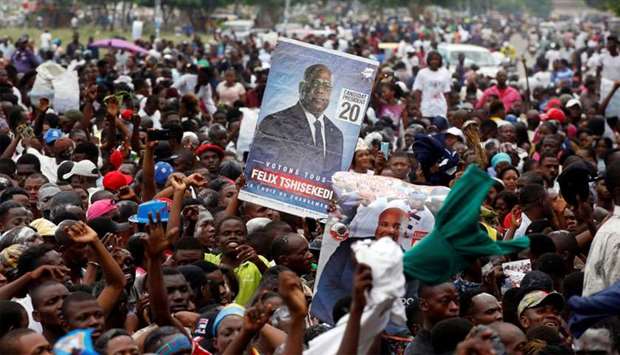Congo opposition leader Felix Tshisekedi was on Thursday declared the winner of the troubled country's presidential election, but another opposition candidate cried foul and vowed to challenge the results.
‘These results have nothing to do with the truth at the ballot box,’ Martin Fayulu said after the electoral commission announced Tshisekedi had won with 7 million votes to Fayulu's 6.3 million.
Fayulu spoke of ‘invented’ numbers and accused the commission of fraud. ‘The Congolese people have been robbed of their victory, something that the people would never accept,’ he said.
The country's influential Catholic Church has also said the electoral commission's results don't match those tallied by their own monitors.
‘The results of the presidential election published by (the electoral commission) do not match those collected by our observer mission,’ the church said in a statement.
While they have not named Fayulu as winner, diplomatic sources say that is what the church's figures show.
Tshisekedi's win came as a surprise to many who thought the results would be rigged in favour of ruling party candidate Emmanuel Ramazani Shadary.
In fact Shadary, who was long-serving President Joseph Kabila's preferred successor, received the lowest number of votes of the three candidates.
If the losing candidates concede defeat, this would pave the way for the first democratic transition in some 60 years.
The UN Secretary General issued a cautious statement after the results were announced, urging calm in the country prone to political violence.
‘The secretary general calls on all stakeholders to refrain from violence and to channel any eventual electoral disputes through the established institutional mechanisms,’ the statement said in part.
Response from the European Union was equally muted.
The EU ‘noted that these results have been contested by a part of the opposition. We are also waiting for the reactions of different observation missions,’ said EU foreign policy spokeswoman Maja Kocijancic.
French Foreign Minister Jean-Yves Le Drian said Tshisekedi's victory was ‘not in line with the results we have been able to observe here and there.’ Le Drian told CNews that Fayulu, ‘appeared to be coming out ahead.’ Belgian Foreign Minister Didier Reynders called the electoral process ‘chaotic,’ telling the RTBF broadcaster that he could ‘understand the concerns that are already being expressed in several places.’ The constitutional court still needs to validate the vote in the coming days, with the swearing-in of the new president planned for January 18.
The December 30 elections - which were delayed for two years as Kabila clung to power - were plagued by problems, including a fire that destroyed voting machines, militant attacks and an ebola outbreak.
Among the many election setbacks, the most concerning was that voting did not take place in three areas of the country, with the electoral commission putting it off due to an Ebola outbreak and violence.
Those regions - which are opposition strongholds - have been told they can vote in March, but with the new president due to be sworn in later this month, over a million voters were effectively disenfranchised.
Both main opposition candidates had told dpa before the vote that they thought the polls would not be free and fair, given Congo's troubled political history.
Following independence from brutal colonial ruler Belgium in 1960, Congo saw a series of political mutinies, murders and coups, leading to the rule of Mobutu Sese Seko.
After years of misrule Mobutu was eventually deposed by Laurent-Desire Kabila - the father of the current president. When the elder Kabila was assassinated in 2001, his son took the helm.
The central African country has been plagued by wars and is also home to numerous militias - some fighting along ethnic lines and others over lucrative mineral resources.
Congo has abundant deposits of copper, gold and diamonds, as well as cobalt and coltan - which is highly sought-after because of its use in mobile phones.
The mineral wealth has not however trickled down and millions of Congolese remain mired in poverty.
There were big celebrations at Tshisekedi's party headquarters Thursday afternoon, but other Congolese had a mixed reaction.
Philemon Kubuya, a banker in Goma, told dpa he was convinced that Fayulu won and Kabila did a deal with Tshisekedi.
‘But I still welcome the fact that (Kabila) is leaving and Shadary has not won.’

